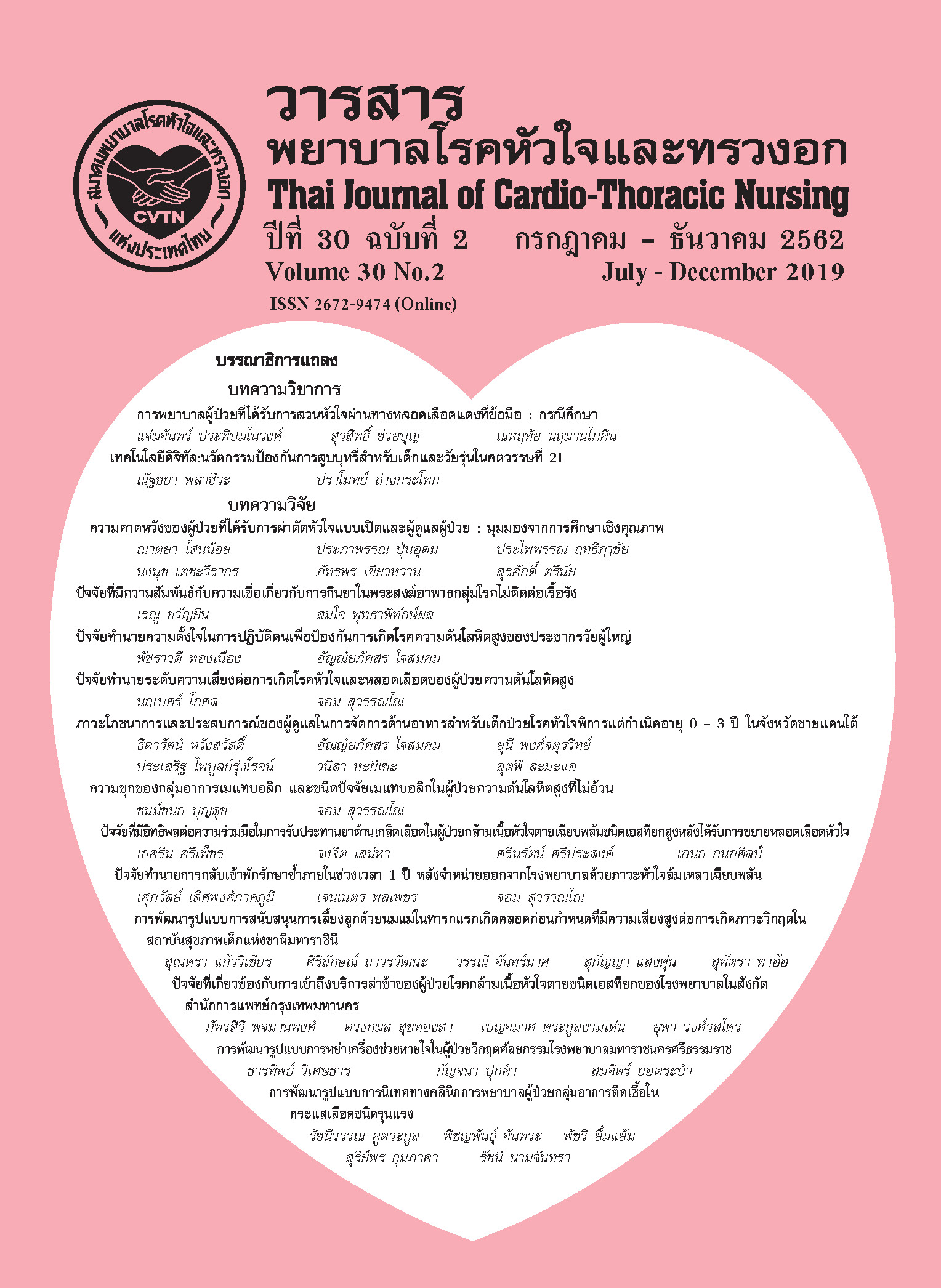Factors related to beliefs about taking medicines among the monks with non-communicable diseases
Keywords:
Monks, beliefs about taking medicines, non-communication disease, DM, HypertensionAbstract
This descriptive study was purposed: (1) to evaluate the levels of beliefs about taking medicines and (2) to explore factors related to the beliefs about taking medicines in the monks with non-communication diseases. The sample of this study comprised of 370 monks with diabetes mellitus and hypertension receiving healthcare services at outpatient department, Priest Hospital. Data were collected by using the of Beliefs about Medicines Questionnaire (BMQ) of Horn,et,al., translated into Thai by Yosapon Leaungsomnapa. Data were analyzed by using in to descriptive statistic and Spearman's correlation.
The results revealed that about fifty-six percent (56.2%) of monks with non-communicable diseases had the lowest level of beliefs of taking medicines, while 43.80% had the highest level of beliefs about taking medicines. Moreover, the education levels and the discomfort of medication consuming were positively correlated with the beliefs about medicines significantly (p<0.05). The duration of illness was negatively correlated with the beliefs about taking medicines significantly (p< 0.05). However, age, quantity of medication consuming, and domicile were not significantly correlated with the monks’ beliefs of taking medicines (p>0.05).
This study suggests that the nurses should apply beliefs about medication used to develop the program to improve drug adherence in the monks with non-communication diseases effectively.
References
Priest Hospital. Monk’s health report of priest hospital 2011-2013. Bangkok: Priest Hospital; 2015. (in Thai).
Srithamma S. Health care development project for monks-novices throughout Thailand. Nonthaburi: Bureau of Information office of the Permanent Secretary of MOPH; 2015. (in Thai).
Sarinphakorn W. Practical management of chronic medical disease. Bangkok: Internal Medicine Rajavithi Hospital and College of Medicine, Rangsit University; 2015. (in Thai).
Kucukarslan SN. A review of published studies of patients’ illness perceptions and medication adherence: lessons learned and future directions. Res Social Adm Pharm. 2012 Sep-Oct;8(5):371-82. doi: 10.1016/j.sapharm.2011.09.002.
Rujisatian N. The relationship of illness representations and beliefs about medications to adherence to oral hypoglycemic medications in persons with type 2 diabetes. [Thesis of Master of Nursing Science]. Bangkok: Mahidol University, 2009. (in Thai)
Leventhal H, Diefenbach M, Leventhal EA. Illness cognition: using common sense to understand treatment adherence and affect cognition interactions. Cogn Ther Res.1992; 16: 143-63.
Leventhal H, Brisssette I, Leventhal EA. The common-sense model of self-regulation of health and illness; the self-regulation of health and illness behavior. New York: Routledge; 2003.
Priest Hospital. Annual report priest hospital 2014. Bangkok: Priest Hospital; 2015. (in Thai).
Kuntiyanun S, Maturos T, Kwanyuen R. Quality of life among diabetic monks, the Priest hospital. Bangkok: the Priest hospital; 2010. (in Thai).
Horne R. Representations of medication and treatment: advances in theory and measurement. In: Petrie KJ, Weinman J, editors. Perceptions of health and illness: current research and applications. London: Harwood Academic; 1997.
Leaungsomnapa Y, Promproh S, Leaungsomnapa S, Sourthao Y. Influence of beliefs about medication on high group of medication adherence in hypertensive patients. The Journal of Prapokklao Hospital Clinical Medical Education Center. 2013; 30 (2): 146-57. (in Thai).
Kanjanawasee S. Classical test theory. 7th ed. Bangkok: Chulalongkorn University Printing House; 2014. (in Thai)
Kwanyuen R., Amput P., Siriratchatha C., Sangsanor P. The effect of Self-Monitoring of blood glucose controlling among monks with diabetes mellitus, Priest hospital. SDU research Journal. 2016; 9 (3): 99 – 112. (in Thai).
Leetaweesuk J, Makee P, Charachan P, Yana P, Jindawattanawong P, Thiratanyaboon L,et, al. Drug use behaviors of elderly patients with chronic disease in Chiang-Tong community Rahang Sub-District, Muang-Tal District, Tak Province. [Master Thesis of Science in Medicine]. Phitsanulok: Faculty of Graduate studies, Naresuan University; 2013. (in Thai).
Horne R, Chapman SC, Parham R, Freemantle N, Forbes A, Cooper V. Understanding patiens’ adherence-related beliefs about medicines prescribed for long-term condition: a meta-analytic review of the necessity-concern framework. PLoS One. 2013 Dec 2;8(12):e80633. doi: 10.1371/journal.pone.0080633. eCollection 2013.
Puengdokmai P., Charoenkitkarn V., Pinyopasakul W., Sriprasong S., Dumavibhat C. Factors influencing medication adherence in hypertensive patients without complications. Princess of Naradhiwas University Journal. 2016; 8 (1): 16 – 26. (in Thai).
Supachaipanichpong P., Vatanassomboon P., Tansakul S., Chumchuen P. Knowledg and beliefs in medication use of dieticptiets with non-medication adherence. Veridian E-Journal Science and Technology Silpakorn University. 2014; 1 (1): 1-12. (in Thai).
Becker MH, Maiman LA. The health belief model and sick role behavior. Health Educ. Monogr. 1974; 2 (4): 409-19.
Chanachai K. Factors affecting the medication compliance of elderly patients with chronic diseases at Namkleang hospital Namkleang district Sisaket province. Research and Development Health System Journal. 2015; 8 (2): 287 – 92. (in Thai).
Downloads
Published
How to Cite
Issue
Section
License
บทความนี้ยังไม่เคยตีพิมพ์หรืออยู่ในระหว่างส่งไปตีพิมพ์ในวารสารอื่น ๆ มาก่อน และกองบรรณาธิการขอสงวนสิทธิ์ในการตรวจทาน และแก้ไขต้นฉบับตามเกณฑ์ของวารสาร ในกรณีที่เรื่องของท่านได้ได้รับการตีพิมพ์ในวารสารฉบับนี้ถือว่าเป็น ลิขสิทธิ์ของวารสารพยาบาลโรคหัวใจและทรวงอก






